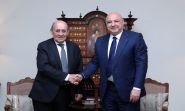
As Lebanon teeters on the edge of another potential war, with Hezbollah’s arms drawing the country closer to full-scale conflict with Israel, a more existential question arises: Why does the Lebanese state continue to abdicate its constitutional responsibilities? Why is the government still unwilling, decades after the Taif Agreement, to assert that the monopoly of arms belongs to the state, and the state alone?
The Lebanese Constitution and the National Defense Law are clear: the Lebanese Armed Forces are the sole legitimate military body entitled to bear arms and protect the country. Yet, this principle remains a theoretical ideal rather than an actionable policy. Hezbollah, the most powerful non-state actor in Lebanon, continues to operate a parallel military infrastructure with complete impunity, despite growing domestic and international calls for disarmament, and despite the fact that this undermines national sovereignty at its core.
The political class, however, remains silent. Or worse, complicit.
During an intimate on-the-record roundtable organized on Wednesday for a couple of media platforms, U.S. Special Envoy Tom Barrack said exclusively to This is Beirut that he believes Lebanese officials are increasingly open, perhaps for the first time in decades, to discussing normalization with Israel. While the issue remains politically difficult, he emphasized that private conversations revealed a new kind of pragmatism and readiness to explore diplomatic avenues.
A Political Class Paralyzed by Fear
Successive Lebanese governments have treated the question of Hezbollah’s arms like a sacred cow: too dangerous to touch, too embedded to remove. Politicians from most mainstream blocs, whether aligned with Hezbollah or not, are unwilling to even name the issue in public statements. Instead, vague euphemisms like "the resistance" or "the unique Lebanese context" dominate the discourse.
This paralysis is not a reflection of national unity or strategic ambiguity. It is a symptom of political cowardice. Lebanon’s leaders are not neutral; they are afraid. Afraid to provoke Hezbollah. Afraid to provoke its regional backer, Iran. Afraid to risk their positions or their lives in defense of the republic’s most basic principles.
A Deafening Silence on Peace
Just as troubling is the government’s timidity on the question of peace with Israel. As several Arab countries — Egypt, Jordan, the UAE, Bahrain, Morocco — have normalized relations with Israel, Lebanon still clings to an outdated, ideological posture. There is no official debate, no parliamentary discussion, no national conversation. To even suggest opening diplomatic channels with Israel is political suicide in Beirut.
And yet, the costs of this silence are enormous.
Every escalation with Israel, whether it be along the southern border or via rockets fired from Lebanese territory, pulls the country further into regional conflicts that most Lebanese want no part of. Every missed opportunity for dialogue or diplomacy delays the country’s reintegration into a regional order that is rapidly evolving without it.
To be clear, peace cannot be dictated by one side. Israel bears responsibility too. But the refusal of Lebanon’s leaders to even raise the question of normalization, to even study what peace might look like under fair and sovereign terms, is a form of intellectual and political surrender.
Yet there are signs, however faint, that some movement may be possible.
From Lebanon to Syria: A Wider Strategy
Barrack’s remarks came during a wide-ranging roundtable that shed light not only on Lebanon’s paralysis but also on the broader regional shifts in play. Topics addressed included:
- The disarmament of Hezbollah and the potential for a phased roadmap toward placing all weapons under state control, in which he clearly stated: “The timeline for the disarmament of Hezbollah is defined by your neighbors.”
- The recent upheaval in Sweida, Syria, where sectarian protests and civil unrest have shaken the current regime's grip
- The emergence of the new Syrian regime in the making, suggesting that Washington is preparing to deal with the post-Assad dynamics
These discussions place Lebanon at the heart of a regional recalibration, whether it is prepared for it or not.
Between Legal Fiction and Political Reality
The situation has become tragically surreal: a state that has laws it refuses to implement, borders it cannot control, a military it refuses to fully empower, and a public it refuses to tell the truth to.
The Lebanese people deserve better than this endless cycle of ambiguity, half measures, and fear. They deserve leaders who are willing to uphold the law even when it is inconvenient. They deserve a country where decisions of war and peace are made by elected officials, not by militias. They deserve a sovereign state, not a political compromise with armed actors who operate beyond the law.
If Lebanon’s government continues to avoid the hard questions, the hard realities will answer in its place. And by then, it may be too late.




Comments